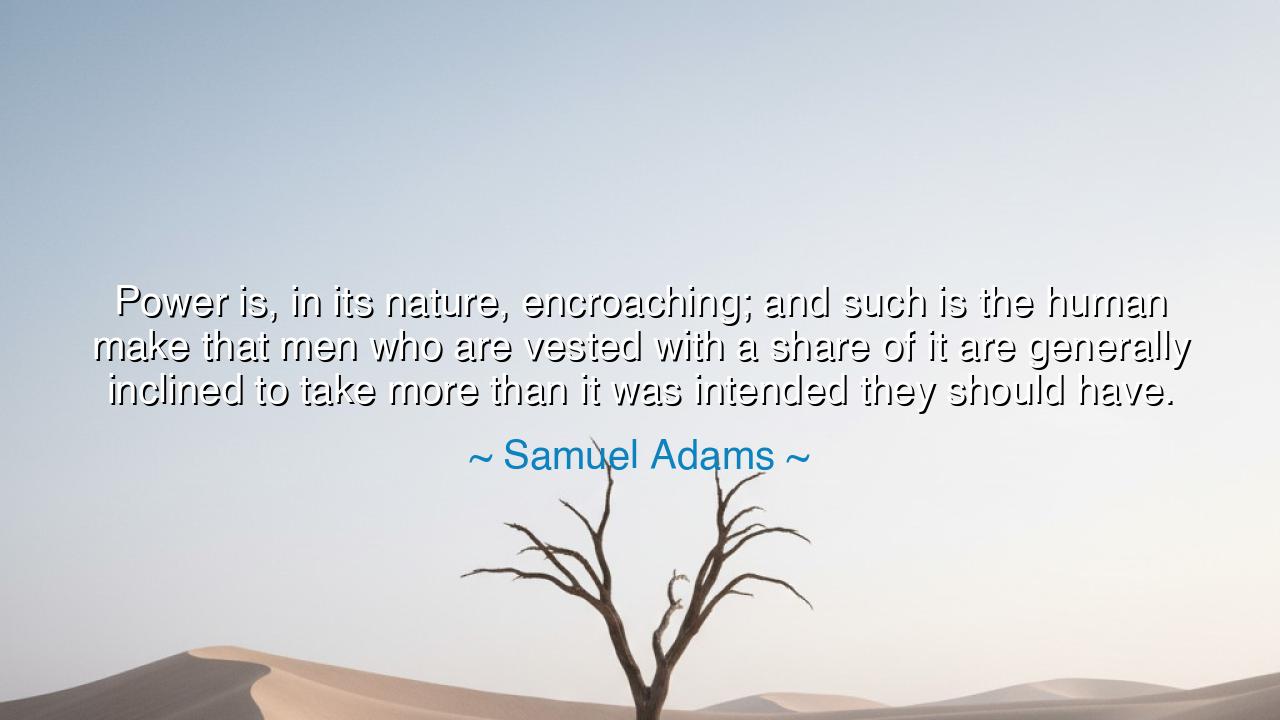
Power is, in its nature, encroaching; and such is the human make
Power is, in its nature, encroaching; and such is the human make that men who are vested with a share of it are generally inclined to take more than it was intended they should have.






The words of Samuel Adams thunder across the ages: “Power is, in its nature, encroaching; and such is the human make that men who are vested with a share of it are generally inclined to take more than it was intended they should have.” In these lines lies a warning, stern as the tolling of a bell before the storm. For Adams, that fiery sentinel of liberty, knew well that power, once granted, rarely rests content within its boundaries. Like fire, it hungers for more fuel; like a river in flood, it presses against its banks, seeking to drown all that stands before it.
To understand these words, we must see that Adams spoke not from idle philosophy but from the living struggle of his day. The American colonies felt the creeping hand of empire tightening around their throats. Taxes imposed without consent, soldiers quartered in their homes, laws issued from afar with no voice of the governed—each was a small encroachment, and each was excused by those in authority as “necessary” or “harmless.” But Adams knew the nature of power: each concession would only summon the next demand, and what began as a spark would blaze into tyranny unless checked by the vigilance of free men.
History confirms his wisdom. Recall the tale of the Roman Republic, founded on checks and balances, on the fierce conviction that no single man should wield absolute dominion. Yet when Julius Caesar crossed the Rubicon, clothed in temporary authority, the old restraints fell away. The Senate had once intended limits, but power, insatiable and encroaching, devoured them. In time, the Republic was no more, replaced by the Empire—majestic, but chained in the iron grip of emperors. What began as a trust ended in despotism, for such is the path when men forget Adams’ warning.
Yet this truth is not confined to nations and empires. In every sphere of human life, we see it. The master who rules harshly over his servants soon believes he rules rightly. The magistrate who bends the law “just once” finds it easier to bend it again. Even in the soul of each man there is a reflection of this: when the appetite is indulged, it demands more; when pride is fed, it grows ever hungrier. Thus, power is not only a matter of kings and parliaments but of the daily choices of every heart.
Adams’ teaching is not meant to cast us into despair but to awaken us to vigilance. If power is encroaching by nature, then it must be bound with strong chains, watched with clear eyes, and resisted by a people who prize their freedom more than their ease. This is why Adams and his companions cried out for constitutions, for divided powers, for eternal watchfulness. They understood that liberty is not preserved by chance, but by the tireless courage of those who refuse to surrender one inch of their rights.
O children of tomorrow, hear the cry of the past: do not be lulled by promises of safety, nor blinded by gifts from those who hold authority. Every “temporary” power seized, every “small” freedom surrendered, is but another stone laid in the road toward servitude. Remember always that once given, power is loath to return; it must be checked, limited, and balanced, lest it consume the very people who bestowed it.
The lesson is this: guard liberty with a jealous heart. In your nations, demand accountability. In your communities, resist the overreach of those who would make themselves masters. Even in your own soul, curb the appetite for dominion over others. For if power is, by its nature, encroaching, then the duty of the wise is to encircle it with law, with conscience, and with courage.
Therefore, let your action be steady: speak when silence would invite oppression, act when delay would breed submission, and remember always the words of Samuel Adams. For power, unchecked, is a flame that consumes the world; but bound by justice and guarded by vigilance, it may yet warm and guide without destroying. This is the ancient charge handed down: freedom is never a gift, but a trust—and only the watchful keep it alive.






AAdministratorAdministrator
Welcome, honored guests. Please leave a comment, we will respond soon